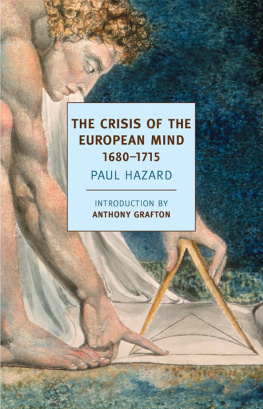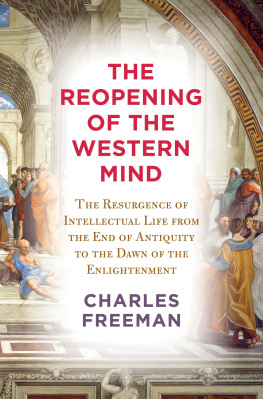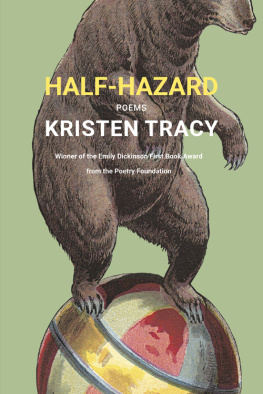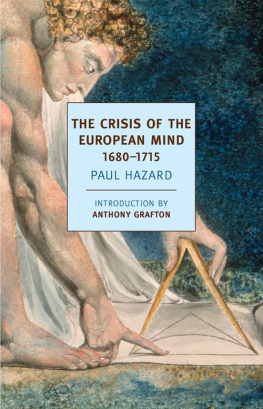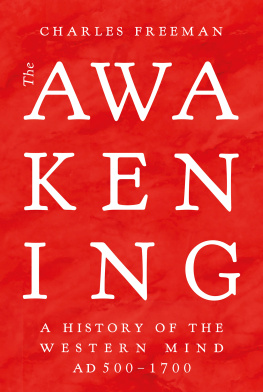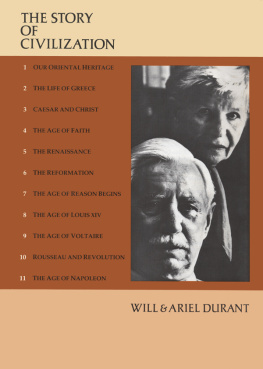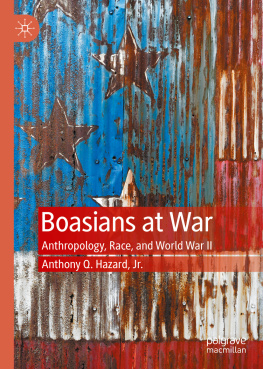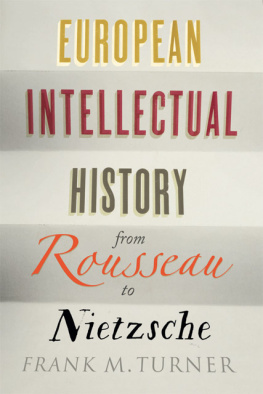PAUL HAZARD (18781944) was an eminent French historian of ideas and a pioneering scholar of comparative literature. After teaching at the University of Lyon and the Sorbonne, he was appointed to the chair of comparative literature at the Collge de France in 1925 and in 1940 was elected to the French Academy. From 1932 on Hazard also taught at regular intervals at Columbia University, and he was in New York when the Nazis occupied France in 1940. He then returned to France to assume the rectorship of the University of Paris but was rejected for the position by the Nazis. Hazards reputation rests on two major works of intellectual history: The Crisis of the European Mind , from 1935, and its sequel, European Thought in the Eighteenth Century: From Montesquieu to Lessing , published posthumously in 1946.
JAMES LEWIS MAY (b. 1873) was a British critic and translator, best known as a translator and biographer of Anatole France. His 1928 translation of Madame Bovary for The Bodley Head was for many years the standard edition. In addition to translating The Crisis of the European Mind , May translated its sequel, European Thought in the Eighteenth Century .
ANTHONY GRAFTON is Henry Putnam University Professor of History and the Humanities at Princeton University. His most recent book is The Culture of Correction in Renaissance Europe .
I
THE FERMENT BEGINS
T O preserve existing conditions, to keep things firm and steady, to avoid any change that might disturb an equilibrium so miraculously attainedsuch was the paramount preoccupation of the Classical Age. There was peril in those questionings that vex the restless spirit. And not only peril, but folly to boot. For let a man rush off to the utmost limits of the globe, what will he find there but what he brings, that is to say, himself ? And even if he found anything else, would he not have wasted his mental and spiritual riches in the effort? Far better that he should concentrate his powers, and focus them on those eternal questions which are certainly not to be solved by aimlessly flitting about from place to place. Seneca has it that the hall-mark of a well-regulated mind is that it can call a halt when it will, and dwell at peace within itself; while Pascal lays it down that all the ills that afflict a man proceed from one sole cause, namely, that he has not learnt to sit quietly and contentedly in a room.
The classical mind, with the consciousness of its strength, loves stability, nay, if it could, it would be stability. Now that the Renaissance and the Reformationbig adventures these! were over, the time had come for a mental stocktaking, for an intellectual retreat. Politics, religion, society, artall had been rescued from the clutches of the ravening critics. Humanitys storm-tossed barque had made port at last. Long might it stay there! Long! Nay, let it stay there for ever! Life was now a regular, well-ordered affair. Why, then, go outside this happy pale, to risk encounters that might unsettle everything? The Great Beyond was viewed with apprehension; it might contain some uncomfortable surprises. Nay, Time itself they would have made stand still, could they have stayed its flight. At Versailles, the visitor got the impression that the very waters had been arrested in their course, caught and controlled as they were, and sent skywards again, and yet again, as though destined to do duty forever.
In Part II of Don Quixote , Cervantes presents to us a gentleman in a green cloth riding-coat whom the Knight of the Rueful Countenance encounters on the road. The gentleman in question is making his way towards home, where comfort and good cheer, on a modest scale, await him. He is of some estate, though possessed of no great wealth. He spends his time with his wife, his children and his friends. His favourite diversions are shooting and fishing, but he keeps neither hawks nor greyhounds, only some decoy partridges and a stout ferret. His library consists of some six dozen books, which are sufficient for his needs. Sometimes he dines with his neighbours and friends, and often invites them in return. His table is neat and clean, and not parsimoniously furnished. He likes freedom within limits, and just-dealing, and good fellowship. He shares his substance with the poor, making no parade of his good works. He always endeavours to make peace between those that are at variance. He is devoted to Our Lady, and ever trusts in the infinite mercy of God. Such is how he portrays himself, and Sancho, whose feelings completely carry him away, leaps off his ass and falls to covering the gentlemans feet with kisses. What mean you by this, brother? said the gentleman; why these embraces? Suffer me to kiss your feet, cries Sancho, for verily your worship is the first saint on horseback I ever saw in all my life.
Don Diego de Miranda, he of the green cloth riding-coat, was not a saint. He was merely a preliminary adumbration, dating back to 1615, of the classical ideal of wisdom and moderation. He does not despise the Knight Errant; indeed, he has a secret admiration for heroes and deeds of derring-do, but he draws the line at taking the road himself. He knows that a man is never so happy as when his mind, his senses, and his heart are all working harmoniously together; and having discovered that recipe for a contented life, he clings to it, and will do so till his dying day.
But times change, and fashions with them. That precious recipe of his wont count for much with the next generation, and, when his grandsons arrive at mans estate, they will regard the Knight of the Green Coat as a very out-of-date old gentleman indeed. They will despise his placid, contented outlook on life. No more, for them, of that spell of calm, when a man might go about his lawful occasions with a tranquil mind. Giving vent at last to desires so long repressed, off they will hie them, up and down the world, looking for trouble. If, as time goes on, we see the itch for travel wax stronger, more widespread; if, quitting village, or town, or mother-land, explorers sally forth to learn how others live and have their being, we must recognize in this the first, faint hint of a change already brewing, a change that, later on, will transform the whole complexion of society.
When Boileau was at Bourbon taking the waters, he felt as if he was at the other end of the earth; Auteuil was world enough for him. So was Paris, for Racine; and both of them, Racine and Boileau, were terribly put about when they had to accompany the King on one of his expeditions. Bossuet never went to Rome; nor did Fnelon. Nor did Molire ever revisit that barbers shop at Pzenas. The great classics were not given to moving about; for the wanderers, we must wait for Voltaire, Montesquieu, Rousseau. But, in between, some obscure forces had been at work, preparing the way for the impending change.

